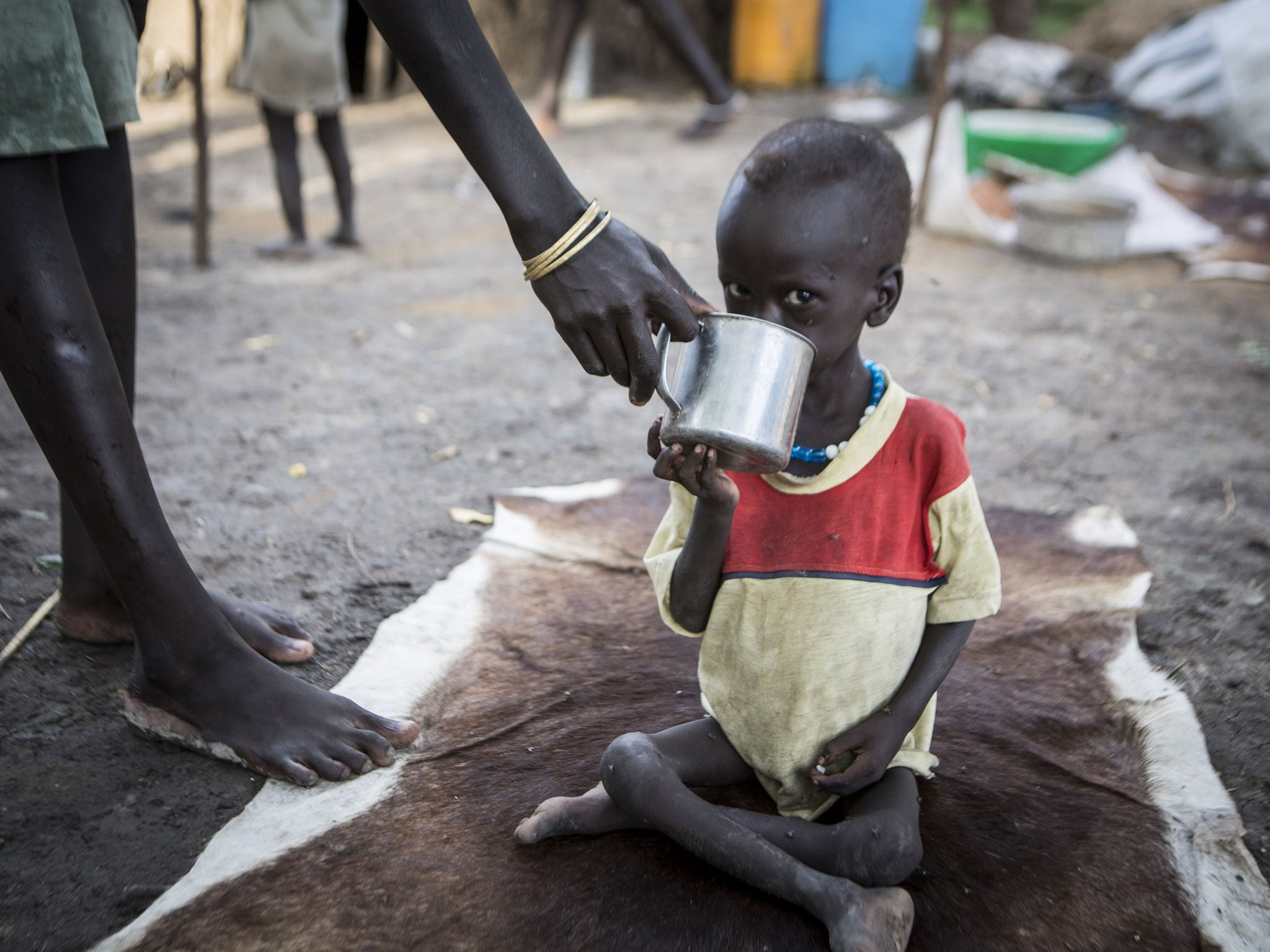South Sudan's civil war puts 5 million at risk of ethnic violence and famine
UN warns the situation is worse than ever – and children are hit hardest

Your support helps us to tell the story
From reproductive rights to climate change to Big Tech, The Independent is on the ground when the story is developing. Whether it's investigating the financials of Elon Musk's pro-Trump PAC or producing our latest documentary, 'The A Word', which shines a light on the American women fighting for reproductive rights, we know how important it is to parse out the facts from the messaging.
At such a critical moment in US history, we need reporters on the ground. Your donation allows us to keep sending journalists to speak to both sides of the story.
The Independent is trusted by Americans across the entire political spectrum. And unlike many other quality news outlets, we choose not to lock Americans out of our reporting and analysis with paywalls. We believe quality journalism should be available to everyone, paid for by those who can afford it.
Your support makes all the difference.Women walk for miles, barefoot down muddy tracks, to come to malnutrition clinics. They carry with them listless and emaciated children. In this small part of Jonglei state, more than a quarter of children are thought to be severely malnourished – well above crisis levels. In areas where conflict is fiercer, life is harder still.
At one clinic, Nyapuoch, a mother who fled the fighting in Malakal and walked for days to reach safety, has nothing to eat and nowhere to stay.
"It is hunger and sickness that are really killing people and making us suffer now," she says, her thin arms wrapped round the twin baby girls sitting quietly in her lap. Her daughters are getting treatment for malnutrition, but thousands more are growing increasingly desperate as they wait for food assistance.
The crisis in South Sudan, where thousands of people have been slaughtered and more than a million displaced, is now greater than that endured by Darfur or the Central African Republic, a senior UN diplomat cautioned on Friday.
Almost five million are in dire need of humanitarian assistance as a result of ethnic violence that began in December after President Salva Kiir accused his vice-president, Riek Machar, of plotting his overthrow.
Jonglei has been hit hard by the conflict, fought over by both sides and now divided into opposition- and government-held areas. As a result, more than 200,000 people in Jonglei are displaced, meaning they cannot sow seeds in this crucial planting season ahead of the rains. Getting in supplies of everything from food to petrol has become a major challenge.
In the market in Akobo, South Sudanese and Ethiopian traders vie for business, piling up their small pyramids of grain ready to sell. But no one is buying. The price of sorghum, a staple food in this area, has tripled in the past six months because traders have to take a circuitous route to bring their goods in. Many people, having lost their livelihoods in that time, cannot afford to buy it.
Instead, families are resorting to foraging for leaves, berries and bitter fruits to survive.
Two young sisters are out in the bush trying to find leaves to eat and firewood to sell. Nyagoa, nine, and Nyanthor, 12, left Malakal earlier this year after their father died, walking to Akobo with their mother, grandmother and three year-old brother.
Like other South Sudanese children, they have had to drop out of school since the fighting started in order to help their mother. Their younger brother, who is severely malnourished, gets a weekly supply of a nutritious peanut paste from a Save the Children clinic.
However, the rest of the family live hand-to-mouth, scavenging to find what wild food they can and occasionally buying a little flour when they can sell their firewood. Dressed in a ragged blue dress with short hair yellowed from chronic malnutrition, Nyagoa picks leaves from the ground while her older sister struggles to pull dead branches from a tree.
"If we did not go to get the firewood [to sell], there'd be nothing to eat," says Nyanthor. "Our father used to get food for us, but now he's gone it's very difficult. Here there's nothing for us to eat, only berries and leaves from the forest."
Theirs is a familiar story: it is the youngest citizens of the world's youngest nation that have been hit hardest by the current crisis. They were promised a better life when the country celebrated its independence from the north three years ago, but those promises have yet to be kept. The UN has described gross human rights violations – ethnic killings, rape, revenge attacks, and the deliberate targeting of children – on a "massive scale".
The situation promises to get worse when the rainy season starts at the end of this month. Already, aid planes are struggling to land on dirt runways and early rains have made local roads almost impassable.
The challenges are huge. The UN's appeal – last week it said the world needed to donate another £300m to South Sudan – is less than half funded. Without more money for the humanitarian relief effort and a lasting peace deal, there are real fears that many more children will die.
Caroline Anning works for Save the Children in South Sudan
Join our commenting forum
Join thought-provoking conversations, follow other Independent readers and see their replies
Comments